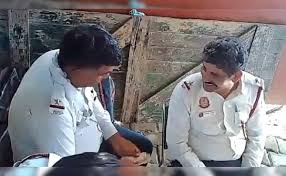
Table of Contents
Delhi Traffic Cops Suspended for Bribe Scandal: A Closer Look
In a shocking revelation, three traffic police officers in Delhi have been suspended following an investigation that uncovered their involvement in a bribe scandal. The incident, captured on CCTV, has brought to light serious issues of corruption within the Delhi Police department. This case not only highlights the ongoing struggle against corruption but also raises questions about systemic issues and the measures needed to address them.
The Incident: How It Unfolded
The controversy erupted when a CCTV footage, initially leaked and later verified, showed three traffic police officers engaging in the illegal distribution of bribe money. The footage reveals a sequence of events where the officers are seen receiving bribes from various sources, which they then divided among themselves in a conspicuous manner. This footage was a significant breakthrough in exposing the corrupt practices that had long been suspected but lacked concrete evidence.
The officers involved were assigned to manage traffic flow and enforce regulations on some of Delhi’s busiest roads. Their duties included issuing fines for traffic violations and ensuring that road safety measures were adhered to. However, instead of upholding the law, they exploited their positions for personal gain.
The Fallout: Immediate Actions Taken
Following the emergence of the CCTV footage, a swift response from the Delhi Police was inevitable. An internal investigation was launched to examine the footage and gather more evidence regarding the officers’ actions. The investigation confirmed the authenticity of the footage, leading to the suspension of the three officers involved. The Delhi Police Commissioner emphasized that such behavior was unacceptable and assured the public that stringent actions would be taken against those found guilty of corruption.
In addition to the suspension, the officers are now facing a departmental inquiry. This process will determine the extent of their involvement, the total amount of bribes received, and whether they engaged in any additional corrupt practices. The inquiry will also address how such behavior went unchecked and identify any systemic issues within the department.
Public Reaction: A Call for Reform
The public reaction to the scandal has been one of outrage and disillusionment. The revelation has fueled widespread criticism of the Delhi Police, a force already grappling with various challenges related to public trust and efficiency. Citizens have expressed frustration over the persistent corruption within law enforcement agencies and called for comprehensive reforms to address these issues.
The incident has also sparked a debate about the effectiveness of existing mechanisms to combat corruption. Many argue that while the suspension of the officers is a necessary step, it is not sufficient. There is a demand for a more robust system to prevent such occurrences, including improved surveillance, stricter oversight, and a transparent process for reporting and addressing corruption.
Systemic Issues: Corruption Within Law Enforcement
This scandal is not an isolated case but rather part of a larger issue of corruption within law enforcement agencies. Instances of bribery and misconduct among police officers are well-documented across various regions, and this case in Delhi highlights the need for systemic changes.
Several factors contribute to corruption within the police force:
- Lack of Accountability: In many instances, police officers operate with little oversight, making it easier for corrupt practices to go unnoticed. Strengthening internal monitoring and accountability mechanisms can help address this issue.
- Low Salaries and High Pressure: Low salaries and the high-pressure nature of the job can drive some officers to seek additional sources of income through illicit means. Addressing these root causes by ensuring fair compensation and adequate support can reduce the temptation to engage in corrupt practices.
- Ineffective Reporting Mechanisms: Often, mechanisms for reporting corruption within the police force are either inadequate or lack transparency. Developing a more effective and secure system for reporting and investigating complaints is crucial for combating corruption.
Measures for Improvement: What Needs to Change
In light of the scandal, several measures are being discussed to prevent similar incidents in the future and to restore public trust in the Delhi Police:
- Strengthening Internal Controls: Implementing more rigorous internal controls and oversight mechanisms can help detect and address corruption more effectively. Regular audits, surprise checks, and the use of technology for surveillance can aid in this effort.
- Enhancing Transparency: Increasing transparency within the police force by making internal processes and disciplinary actions more open to public scrutiny can help build trust and deter corrupt behavior.
- Training and Awareness: Providing regular training to police officers on ethics and anti-corruption practices can reinforce the importance of integrity and the consequences of engaging in corrupt activities.
- Encouraging Whistleblowing: Establishing and promoting secure channels for whistleblowing can empower officers and citizens to report corrupt practices without fear of retaliation. Ensuring that whistleblowers are protected and their complaints are taken seriously is essential.
- Revising Recruitment and Promotion Policies: Revising recruitment and promotion policies to include rigorous background checks and ethical evaluations can help ensure that only individuals with high moral standards are entrusted with positions of authority.
The Road Ahead: Restoring Trust
The suspension of the three traffic cops in Delhi is a significant step, but it is only the beginning of what needs to be a broader effort to combat corruption within the police force. Restoring public trust will require a sustained commitment to reform, transparency, and accountability.
The Delhi Police must demonstrate that it is serious about addressing the systemic issues that allowed this scandal to occur. By implementing meaningful reforms and fostering a culture of integrity, the police force can work towards rebuilding its reputation and ensuring that such incidents do not recur.
In conclusion, the bribe scandal involving Delhi traffic cops is a stark reminder of the ongoing challenges in tackling corruption within law enforcement. While the immediate actions taken against the officers involved are a step in the right direction, addressing the broader systemic issues will be crucial for achieving long-term change and restoring public confidence in the police.







